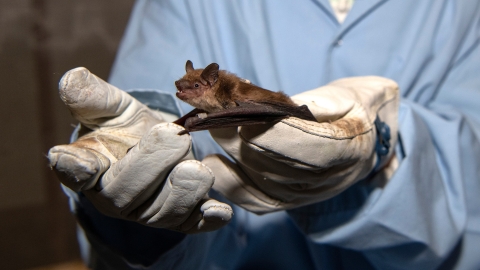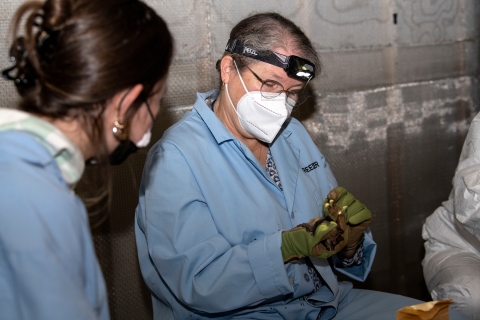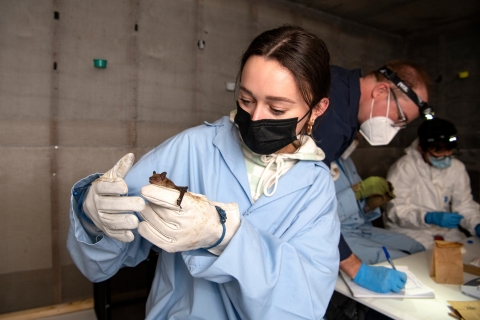
Taking Flight: Bat Virus Research Leads Bucknell Researchers to Uganda This Spring
January 31, 2022
Funded by a $2.9 million grant, the Bucknell researchers will investigate why certain African bat species are tolerant to Ebola viruses. Photo by Emily Paine, Communications
If you want to know how to beat some of the world's most virulent diseases, ask a bat. The winged night-flyers are one of the most prominent mammal groups to have coevolved with infections like Ebola and coronaviruses, making them the ideal host for these deadly illnesses — and the perfect study subjects for Bucknell's immunology and wildlife biology experts.
In 2021, Bucknell biology professors DeeAnn Reeder and Ken Field received a $2.9 million grant from the National Institute of Allergy and Infectious Diseases (NIAID) to study African bats' physiological and immune responses to the Ebola virus. This spring, Field, Reeder, two postdoctoral fellows, and a small group of Bucknell students aim to head to Uganda to launch the first phase of that research, following a successful pilot study conducted at Bucknell last fall.
The team had anticipated traveling to Africa in summer 2021 until COVID-19 derailed their plans. So to develop their techniques and methodology, "we figured we'd take advantage of the animal housing facilities we have on campus to really work through the tests we'll run in Uganda," Reeder says.
Promising Results
The second-largest order of mammals, bats comprise about 20% of all classified mammal species worldwide. But that doesn't mean they're all the same. One bat family's immune response might differ from another based on a variety of factors, including hibernation and seasonal behavior changes.
"Bats are an incredibly diverse group of animals, with more than 1,400 species," says Reeder, who teaches within Bucknell's animal behavior program. "Some really interesting things have been discovered about bats' immunology, but we have yet to figure out what is universal to all and what's specific to certain lineages."
To get a glimpse into the immune processes of bats with no links to Ebola, the researchers collected 11 North American big brown bats from around the Susquehanna Valley that were then housed in flight cages in Bucknell's Rooke Science Building. After adjusting to lab life — which required learning to eat mealworms from a dish instead of airborne insects — the bats were introduced to an Ebola-like particle containing three of the proteins found in the virus.
"To be clear, it's not Ebola. We're working with a vaccine of sorts that simply triggers the bat's immune system to react as if it's been exposed to Ebola," says Field, who has previously studied North American bats affected by a fungal disease called white-nose syndrome. "In this pilot study, we wanted to see what processes these bats are turning on to fight infection and if their bodies would create memory cells that would boost their immunity in the future."
For 35 days, the professors and their students used temperature loggers to monitor fever in the bats and analyzed blood samples for antibodies, among other tests. They found that the animals did indeed exhibit symptoms such as fever — which is the body's attempt at killing the virus — and created antibodies to shore up their immunity in case of future infection.

To get a glimpse into the immune processes of bats with no links to Ebola, the researchers first collected bats from across the Susquehanna Valley. Photo by Emily Paine, Communications
"This gave us confidence that the dosage we'll use on the ground in Uganda will trigger an immune response," Field says. "And having practiced, we'll have the benefit of knowing exactly what we're doing, down to the pipette tip."
The results of the Uganda study will differ, however, with the introduction of the vaccine to fruit and free-tailed bats, two native African species that have a history of coexisting with Ebola viruses. In these bats, the researchers expect to see a more tempered reaction and will focus on analyzing the physiological and immune behaviors that allow these species to live with the disease.
"One of the reasons we think bats are capable of carrying these viruses is the theory that they generate a fever every night as they fly," Reeder says. "Normally, your body will trigger fever to stop a virus from replicating. But when you have a virus that's coevolved in a bat that frequently spikes a fever, it learns how to persist in those conditions."
The virus then becomes even more deadly to humans, whose immune systems go into overdrive to combat the infection.
"People who succumb to illnesses like Ebola and COVID are oftentimes dying due to their own immune responses," Reeder explains. "So we're on the hunt to figure out what the molecular story is behind African bats' resistance, with the hope that what we discover could ultimately lead to a clinical treatment for humans."
Prioritizing Partnership
The NIAID-funded experiments will begin in February and last four years, in collaboration with scientists at Uganda's Muni University of Technoscience. A significant portion of the grant has served to purchase state-of-the-art instruments that Reeder and Field will gift to their scientific partners. The Bucknell team will also lead workshops and provide training opportunities for Muni University students, equipping them with the skills to continue this line of research for years to come.
"Something that Ken and I are always conscientious of — and teach our students about as well — is the problematic history of Westerners working in developing nations, which we call colonialist science," Reeder says. "We're not swooping in to tell them how to be better scientists. We must respect their expertise while also providing the infrastructure they need to move this research forward — because, at the end of the day, these are their animals.
"In that spirit, we're also going to be sequencing the full genome of the bats we're working with so that genetic information is freely available to Ugandan scientists who want access to it," she adds.

In addition to two postdoctoral fellows, Field and Reeder intend to bring a small group of Bucknell students to conduct research in Uganda. Photo by Emily Paine, Communications
For biology major Isabel Steinberg '23, who plans to join Field and Reeder on the trip, traveling to collaborate with scientists halfway around the globe is the ultimate capstone on her junior year at Bucknell. Steinberg has been working on the project since the fall of her sophomore year and helped transition the big brown bats when they arrived in Bucknell's lab.
Once in Uganda, she'll assist Field in analyzing the African bats' production of T and B cells, which help the body attack a virus and hasten its immune response in the future.
"I didn't realize how much I'd love working with these animals until one flew out of my hand, and it was just this magical moment," Steinberg says. "It's amazing to be working so closely on an issue that's been impacting the world so monumentally. It makes me feel like I'm not just a student — I'm a real scientist."

